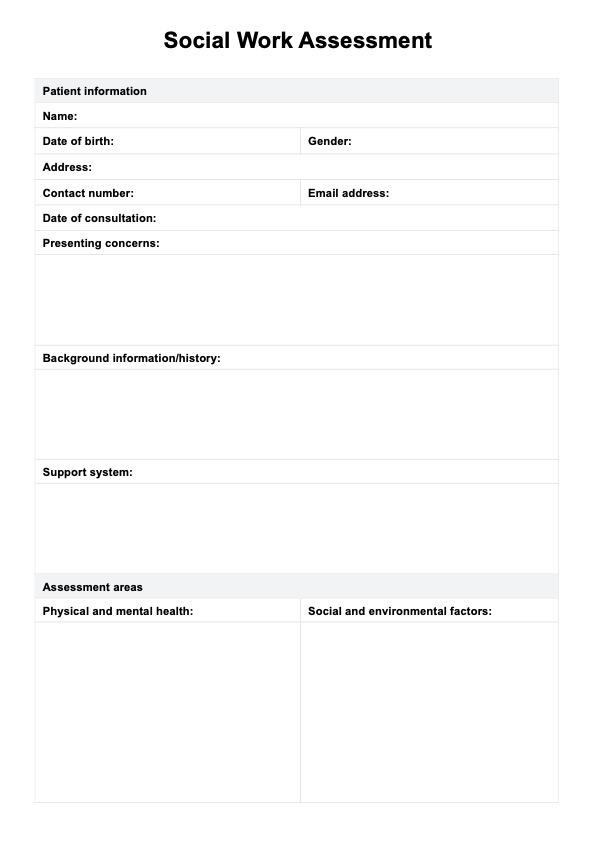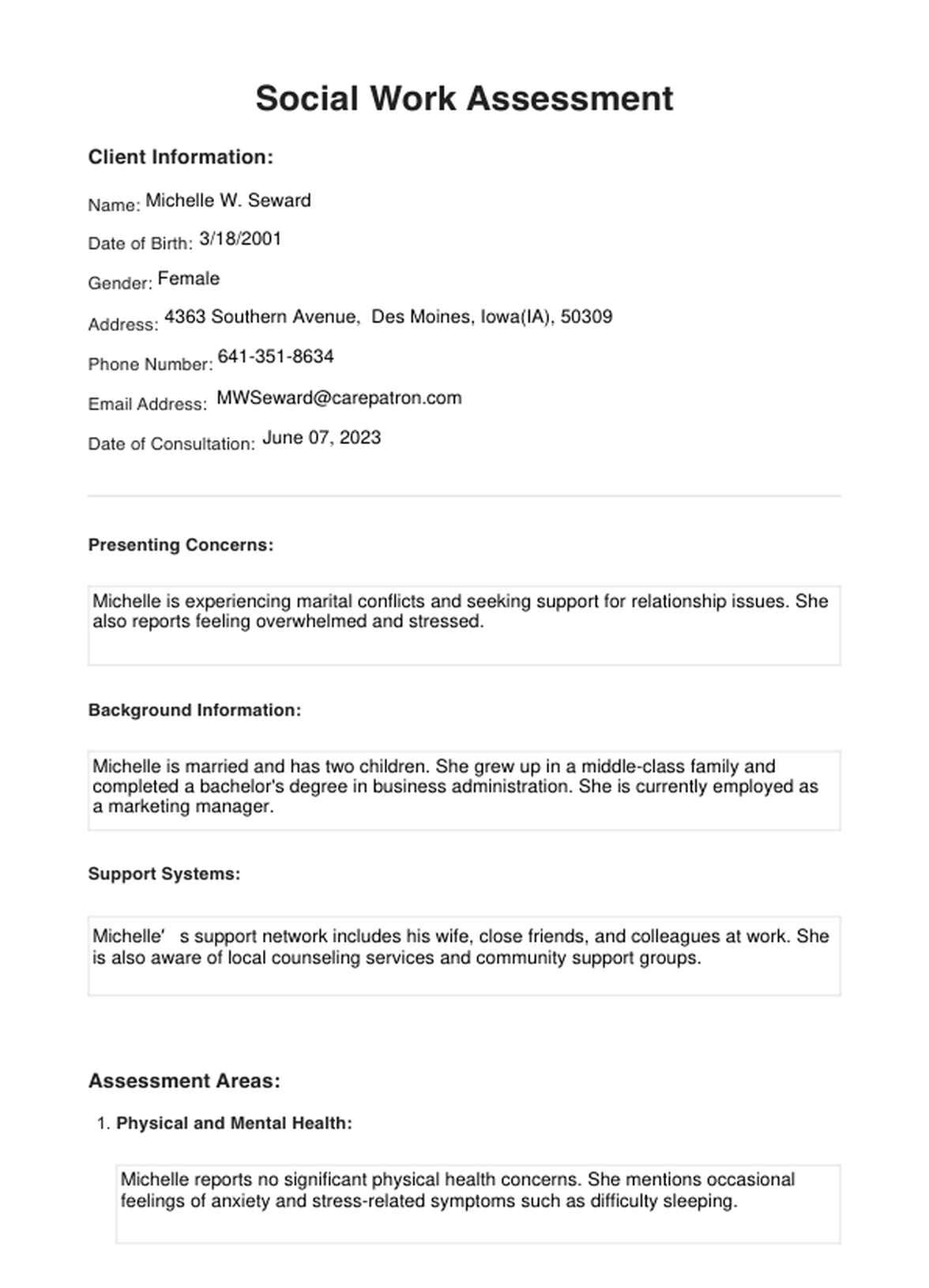
Check out our comprehensive social work assessment for individuals and communities. Address client needs and strengths for empowered change and greater well-being!

By Bernard Ramirez on Jul 17, 2024.


A social work assessment is a systematic process social workers use to gather information and evaluate the needs, strengths, and resources of individuals, families, and communities. It is crucial to understand the unique circumstances and challenges individuals or groups face and formulate appropriate interventions.
The assessment aims to thoroughly compile pertinent data about a person's physical and mental health, social relationships, living circumstances, employment status, educational background, and access to resources and services. It entails speaking with people, reviewing documentation, and working with other healthcare providers or organizations.
A social work assessment has many different goals. It aids social workers in determining the precise requirements and problems that affect a person or community, such as deprivation, domestic abuse, substance abuse, mental health issues, or inadequate housing. Social workers can create interventions that encourage positive change and improve well-being by being aware of these factors.
A social work assessment also emphasizes resources and strengths in addition to problems. It highlights the existing support networks, coping mechanisms, and personal assets of people and communities, recognizing their innate resilience and capabilities. Social workers can help people and communities overcome obstacles and capitalize on their resources by leveraging these strengths.
An extensive care plan or intervention strategy is created using the data gathered during a social work assessment. It aids social workers in locating suitable services, assets, and interventions that address the identified needs and capitalizes on the individual's unique strengths. Thanks to this collaborative and client-centered approach, the interventions will be tailored to the individual's or community's specific needs and circumstances.
This social work assessment is a free, downloadable template for you to use. If you would like to know more about Carepatron's templates, feel free to check out the video below.
PDF Template Example PDF

Using the printable social work assessment template is a straightforward and efficient process that involves the following steps:
Obtain the printable social work assessment template, which is available in a printable format. You can download it from Carepatron or create a customized version based on your needs.
Begin by collecting essential information about the client, such as their name, age, gender, and contact information. This information will serve as a reference throughout the assessment process.
Prompt the client to articulate the main issues or challenges they face. Pay attention to keywords and phrases they use to describe their concerns, as these will help guide the assessment and subsequent interventions.
Gather relevant information about the client's personal history, including their family dynamics, cultural background, educational background, and employment history. This information provides valuable context for understanding the client's current situation.
Explore the client's support network, including family, friends, and community resources. Evaluate the strength and availability of these support systems as they can significantly impact the client's well-being.
Systematically address the different assessment areas outlined in the template, such as physical and mental health, social and environmental factors, education and employment, financial situation, and legal and safety issues. Gather specific information about each area to comprehensively understand the client's needs and strengths.
Identify the client's strengths, including personal skills, resilience, and available support systems. Additionally, consider community resources that can be leveraged to address the client's needs effectively.
Based on the assessment findings, summarize the client's needs, strengths, and available resources. Provide recommendations for interventions, referrals, or further assessments as required. These recommendations should be tailored to the client's unique circumstances and goals.
Once the template is filled out, save a digital copy for your records. Print out a copy to share with relevant professionals or the client to ensure everyone involved has access to the assessment findings and recommendations.
The social work assessment template is a versatile resource used in various instances where a comprehensive evaluation of individuals' needs and strengths is required. Here are some relevant situations where this template can be particularly valuable:
When engaging with a new client, social workers can utilize this template to gather essential information as well as psychological factors and comprehensively understand the client's situation. It is a starting point for developing appropriate interventions and creating an individualized care plan.
Social workers may need to periodically reassess the client's progress and needs while providing ongoing client support, monitoring process and services. The template allows for systematic and consistent evaluations to track changes and adapt interventions accordingly.
During crises, such as domestic violence incidents, natural disasters, or sudden losses, social workers can swiftly gather information using the template to assess the immediate needs of individuals or communities affected. This enables them to provide appropriate support and connect clients with emergency resources.
Social work organizations or agencies can use the Social Work Assessment Template to evaluate the effectiveness of their programs or services. By systematically assessing clients' needs, strengths, and outcomes, organizations can identify areas for improvement and make data-informed decisions.
The template provides a common framework for sharing assessment information in multidisciplinary settings where professionals from various fields work together. This promotes effective communication, collaboration, and coordination of services.
A template is a valuable tool for documenting assessment findings in a structured manner. It ensures that critical information is recorded accurately, allowing for future reference, research purposes, and maintaining a comprehensive client record.
By utilizing the social work assessment Template in these relevant instances, social workers can streamline their assessment process, maintain consistency, and ensure a holistic understanding of clients' needs and strengths. This resource enables effective planning, intervention, and collaboration, ultimately enhancing the quality of social work assessment practice.
Using the free social worker assessment template offers several benefits for social workers and the individuals they serve. Here are some key advantages:
The template provides a structured framework for conducting social work assessments, ensuring that essential areas are systematically addressed. This promotes consistency and thoroughness in the assessment process.
By having a pre-designed template, social workers save time by not having to create an assessment form from scratch for each client. This allows them to allocate more time to engage with clients, gather relevant information, and develop appropriate interventions.
The template covers various domains, such as physical and mental health, social factors, education, employment, finances, and legal safety. This comprehensive approach enables social workers to holistically understand clients' circumstances, needs, and strengths.
The template ensures standardized documentation of assessment findings. It allows social workers to record information consistently, making reviewing and sharing with other professionals involved in the client's care easier.
The template serves as a communication tool that facilitates collaboration among multidisciplinary teams. It provides a common language and format for sharing assessment information, enhancing the coordination of services, and fostering effective teamwork.
With a structured template, social workers can ensure that all relevant aspects of the assessment are addressed, reducing the risk of overlooking crucial information. This enhances accountability in providing comprehensive and evidence-based social work services.
Using a standardized template, social workers can consistently collect data to analyze trends, identify patterns, and contribute to evidence-based practice. This promotes the use of research and best practices in interventions and decision-making.

Social work assessments are a cornerstone of the social work profession. They gather information about a client's strengths, weaknesses, needs, and goals to develop a care plan. Social work assessments can be used in various settings, including child welfare, mental health, and substance abuse treatment.
The history of social work assessments dates back to the early days of the profession. In the late 19th century, social workers began to develop methods for assessing the needs of their clients. These early assessments were often informal and unstructured. However, social workers developed more standardized and systematic assessment methods over time.
In the 1960s, social work assessments were widely used in research. Researchers found that social work assessments could be used to identify risk factors for various problems, such as child abuse and neglect. They also found that these assessments measure the effectiveness of social work interventions.
Studies have shown that social work assessments can effectively identify risk factors for various problems, such as child abuse and neglect. They have also shown that social work assessments can be used to measure the effectiveness of social work interventions. Social work assessments are approved from both academic and practical contexts, and can work to alleviate personal and environmental challenges for improved development.
This includes a study published in the Journal of Social Work Research and Evaluation that found social work assessments effectively identified risk factors for child abuse and neglect (Suppes & Wells, 2017).
A study published in the Journal of the Society for Social Work and Research also found that social work assessments could be used to measure the effectiveness of social work interventions (Pires, 2016).
Good social worker assessment tools will typically highlight and demonstrate competence in areas of the plan, intervention, and outcome for the individual at hand. It may also include a holistic assessment to assess the overarching needs of a client through multiple resources, interviews, surveys, and scales to evaluate social functioning. Identifying the client's strengths and weaknesses to illustrate a specific framework can also boost effectiveness, as this can often display cultural, context, and oppression factors that may contribute to their situation. Keeping these in mind can allow for an ethical and accurate social work assessment that prioritizes the client.
Pires, S. (2016). The use of social work assessments in research: A literature review. Journal of the Society for Social Work and Research, 7(1), 1-18.
Suppes, T., & Wells, K. (2017). The effectiveness of social work assessments in identifying risk factors for child abuse and neglect. Journal of Social Work Research and Evaluation, 18(2), 121-134.
Augsburg University. (2023, March 8). Theories, models, and perspectives cheat sheet. [PDF file]. Retrieved from https://web.augsburg.edu/socialwork/msw/pdfs/cheatsheet.pdf
Social Work Procedures Online. (1987). Social work theory and methods comparison table. [Document]. Retrieved from https://proceduresonline.com/trixcms1/media/1987/social_work_theory_and_methods_comparison_table.doc
Social Work Portal. (2023, March 8). Social work theory. Retrieved from https://www.socialworkportal.com/social-work-theory/
Bremer, J., & Horejsi, C. R. (2006). Social work theory and methods: A contextual approach (3rd ed.). Boston, MA: Pearson Education.